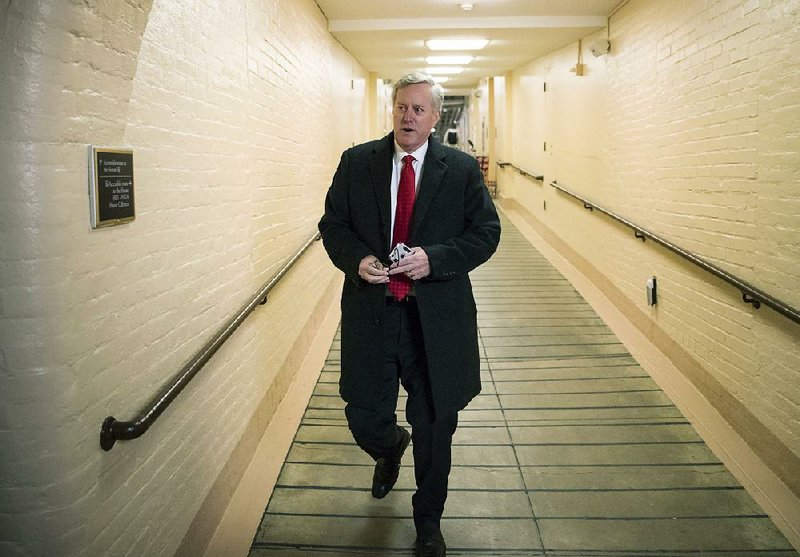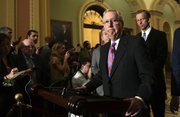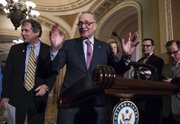WASHINGTON -- Top Republicans tried to quell GOP divisions over the budget, and a partisan immigration clash simmered in the background, as leaders labored Tuesday to push a short-term spending bill through Congress by week's end and avert a partial government shutdown.
Republican leaders postponed a planned House vote on the temporary spending measure from today until Thursday, buying time to iron out disputes with conservatives seeking tighter budget curbs. The delay underscored the clout conservatives wield within the House GOP as leaders work to avoid a shutdown that would deal the latest blow to a party that has strained all year to show it can effectively govern.
There seemed to be little taste by most in both political parties, at least for now, to shutter agency doors with 2018 midterm elections for control of Congress coming into view. That included at the White House, where, in the past, President Donald Trump has explicitly threatened a government shutdown.
"It's always a possibility, but it's certainly not what we hope for," White House spokesman Sarah Huckabee Sanders said of a potential shutdown.
House Minority Leader Nancy Pelosi, D-Calif., and Senate Minority Leader Charles Schumer, D-N.Y., will join GOP leaders for a White House meeting with Trump on Thursday, and Sanders said, "The president hopes to be able to have conversations with them to make sure that [a shutdown] doesn't happen."
RELATED STORY
Schumer touted his and Pelosi's refusal to attend a budget summit last week after Trump disparaged their views on immigration and taxes, and said no deal was in sight.
"We showed the president. No games. This is serious stuff. We think he learned, and he invited us back," Schumer told reporters.
Money for federal agencies runs out at midnight Friday. Senate Majority Leader Mitch McConnell, R-Ky., said Republicans hope Congress will pass legislation this week to finance federal agencies until Dec. 22, giving bargainers time to make longer-term budget decisions and address other issues that have floated into the year-end mix.
Without support from their own conservatives, House GOP leaders would need backing from Democrats to push the temporary measure through the chamber. Democratic votes will be crucial in the Senate, where Republicans by themselves lack the 60 votes needed to approve the legislation.
Knowing that, Democrats are using their leverage to try to force concessions to boost domestic spending in areas such as health care and infrastructure. Hinting that they might back a short-term measure to prevent a shutdown, Schumer said approving such a bill "gives us a little more time to do the things we're talking about now."
DACA FIGHT
A top priority for Democrats is a bipartisan deal to extend a program halted by Trump that protects about 800,000 people who were brought to the U.S. as children and live here illegally.
Trump ended President Barack Obama's Deferred Action for Childhood Arrivals program in September and set a March 5 deadline for lawmakers to act before the bulk of the program's permits begin to expire at a rate of nearly 1,000 per day.
Most on Capitol Hill said a deal must realistically be done before the end of December because a bipartisan agreement would become more difficult in a midterm election year.
"This is the moment," said Cristina Jimenez, executive director and co-founder of United We Dream, the nation's largest organization for deferred-action program participants. The group is planning a rally today in which thousands of members are expected to flock to Washington to lobby Congress.
"It's higher stakes for us in comparison to other fights," Jimenez said. "The reason why is we're facing the most aggressive immigration enforcement environment in our lifetime."
Underscoring the balancing act GOP leaders face, 34 House Republicans sent a letter to Speaker Paul Ryan, R-Wis., urging him to hold a vote by year's end on renewing those deferred-action protections.
But the Republican group, which included a cross-section of new and long-serving members, as well as representatives from urban and rural districts, did not endorse a specific piece of legislation or threaten to withhold their votes on other matters if the issue isn't resolved.
"This is not a threat to leadership," said Rep. Dan Newhouse, R-Wash., adding: "We don't want to just pass legislation that would be popular; we want to pass legislation that would be successful."
"We should not be using these young peoples' lives as political footballs," he said.
The fate of the immigration dispute remains unclear.
Schumer said bipartisan talks are "moving in the right direction." But No. 2 Senate GOP leader John Cornyn of Texas said Republicans oppose mixing the immigration issue into the budget talks because it could cause a shutdown that would "jeopardize our national security and other government functions, just in order to help these young adults."
Cornyn added, "We do want to resolve this, but it's not going to be before the end of this year."
CHILDREN'S HEALTH
Besides temporarily financing the government, McConnell said, the short-term measure would make cash available to several states that are running out of money for the Children's Health Insurance Program. That widely popular program helps provide medical care to more than 8 million children.
"We've got clinics all across the United States that are going to have to start turning children away because [the Children's Health Insurance Program] has not been funded," Rep. Zoe Lofgren, D-Calif., said Tuesday. "That has to be in this bill. We can't allow those children who have medical needs to be turned away."
Moderate Democratic Sens. Joe Manchin III of West Virginia and Tim Kaine of Virginia, who face re-election next year, said they are concerned about the fate of the Children's Health Insurance Program. But they were adamant that they will not join other Democrats in voting against a spending bill because of disagreement on immigration matters.
"I'm worried about the [health insurance] program; it's very concerning to me and the people of West Virginia," Manchin said.
When asked about immigration, Manchin cut off a reporter.
"You're talking about [the deferred-action participants]? Yeah, that's very, very important, and I really sympathize with them, but I've told them that I'm not a vote to shut down," he said.
Kaine said the health insurance program and Deferred Action for Childhood Arrivals "are the two I really want to try to get resolved. I think we need to and we should be able to." At least 13,500 deferred-action participants live in Virginia, he added.
But Kaine said he is "resolutely against shut down [the government] under any circumstances."
"When the government shuts down, it's the Republicans that do it, and they own all the levers of government, and if it shuts down, it's going to be because they decide to do it," he said.
Meanwhile, members of the hard-right House Freedom Caucus, who met Tuesday with Ryan, have been pushing to extend the short-term measure until Dec. 30. They have argued that the leaders' preferred Dec. 22 deadline gives Democrats leverage because lawmakers are tempted to give in and go home for Christmas.
Most Republicans seemed to not be buying that argument and said the Dec. 22 date seemed likeliest.
Rep. Mark Meadows, R-N.C., head of the Freedom Caucus, said his group was having "a good, healthy discussion" with leaders about ways to "fund the government without putting our military at a disadvantage." Many Republicans are eager to quickly approve full-year funding for the military, despite ongoing bargaining over domestic programs.
Rep. Kay Granger, R-Texas -- chairman of an appropriations subcommittee on defense -- laughed when asked if lawmakers were given any clarity Tuesday on the timing of the new bill.
"There's no clarity," she said.
Other Republicans said the timing remained unsettled.
"They didn't tell us what they were going to do yet because, quite frankly, they don't have the will of the conference yet," said Rep. Mark Amodei, R-Nev.
He expressed disgust with the entire process and said Democrats should be happy because Republicans clearly do not have a majority of the votes needed to proceed on spending legislation on their own.
"Right now, if I were them, I'd be happy," Amodei said of Democrats.
Information for this article was contributed by Alan Fram, Andrew Taylor, Darlene Superville and Stephen Ohlemacher of The Associated Press; and by Ed O'Keefe, Mike DeBonis, David Nakamura, Josh Dawsey and Erica Werner of The Washington Post.
A Section on 12/06/2017


